#Inflation Reduction Act of 2022
Explore tagged Tumblr posts
Text
The Domestic Content Bonus Credit’s Promising New Safe Harbor
On May 16, 2024, the Internal Revenue Service (IRS) published Notice 2024-41 (Notice), which modifies Notice 2023-38 (Prior Notice) by providing a new elective safe harbor (Safe Harbor) that will allow taxpayers to use assumed domestic cost percentages in lieu of percentages derived from manufacturers’ direct cost information to determine eligibility for the domestic content bonus credit…

View On WordPress
#business#clean energy#clean energy tax credit#Environmental Law#government#incentive tax credits#Inflation Reduction Act of 2022#IRS#IRS Safe Harbor#legal#safe harbor#Tax#tax law
0 notes
Video
youtube
Unprecedented Clean Energy Investment Boom Sparked By Inflation Reductio...
#youtube#inflation reduction act energy#inflation reduction act explained#inflation reduction act tax credits#inflation reduction act climate#inflation reduction act of 2022
0 notes
Text
#Republicans#health care costs#Pennsylvania#Republican#Scott Perry#Inflation Reduction Act of 2022.#News
2 notes
·
View notes
Text
*types up a 1,200 word response to a critique of the Inflation Reduction Act and bangs my head on table like I just did a line of cocaine*
WHEW!!! NOTHING LIKE USEFUL AMERICAN PUBLIC POLICY IN THE EARLY MORNING. HELLO AND HOW ARE YOU!!!!!!!!!! NOTHING LIKE REAL EARNEST AND CIVIL DEBATE. OOOOOOOH BABY THAT’S GRADE A
4 notes
·
View notes
Text
No paywall version here.
"Two and a half years ago, when I was asked to help write the most authoritative report on climate change in the United States, I hesitated...
In the end, I said yes, but reluctantly. Frankly, I was sick of admonishing people about how bad things could get. Scientists have raised the alarm over and over again, and still the temperature rises. Extreme events like heat waves, floods and droughts are becoming more severe and frequent, exactly as we predicted they would. We were proved right. It didn’t seem to matter.
Our report, which was released on Tuesday, contains more dire warnings. There are plenty of new reasons for despair. Thanks to recent scientific advances, we can now link climate change to specific extreme weather disasters, and we have a better understanding of how the feedback loops in the climate system can make warming even worse. We can also now more confidently forecast catastrophic outcomes if global emissions continue on their current trajectory.
But to me, the most surprising new finding in the Fifth National Climate Assessment is this: There has been genuine progress, too.
I’m used to mind-boggling numbers, and there are many of them in this report. Human beings have put about 1.6 trillion tons of carbon in the atmosphere since the Industrial Revolution — more than the weight of every living thing on Earth combined. But as we wrote the report, I learned other, even more mind-boggling numbers. In the last decade, the cost of wind energy has declined by 70 percent and solar has declined 90 percent. Renewables now make up 80 percent of new electricity generation capacity. Our country’s greenhouse gas emissions are falling, even as our G.D.P. and population grow.
In the report, we were tasked with projecting future climate change. We showed what the United States would look like if the world warms by 2 degrees Celsius. It wasn’t a pretty picture: more heat waves, more uncomfortably hot nights, more downpours, more droughts. If greenhouse emissions continue to rise, we could reach that point in the next couple of decades. If they fall a little, maybe we can stave it off until the middle of the century. But our findings also offered a glimmer of hope: If emissions fall dramatically, as the report suggested they could, we may never reach 2 degrees Celsius at all.
For the first time in my career, I felt something strange: optimism.
And that simple realization was enough to convince me that releasing yet another climate report was worthwhile.
Something has changed in the United States, and not just the climate. State, local and tribal governments all around the country have begun to take action. Some politicians now actually campaign on climate change, instead of ignoring or lying about it. Congress passed federal climate legislation — something I’d long regarded as impossible — in 2022 as we turned in the first draft.
[Note: She's talking about the Inflation Reduction Act and the Infrastructure Act, which despite the names were the two biggest climate packages passed in US history. And their passage in mid 2022 was a big turning point: that's when, for the first time in decades, a lot of scientists started looking at the numbers - esp the ones that would come from the IRA's funding - and said "Wait, holy shit, we have an actual chance."]
And while the report stresses the urgency of limiting warming to prevent terrible risks, it has a new message, too: We can do this. We now know how to make the dramatic emissions cuts we’d need to limit warming, and it’s very possible to do this in a way that’s sustainable, healthy and fair.
The conversation has moved on, and the role of scientists has changed. We’re not just warning of danger anymore. We’re showing the way to safety.
I was wrong about those previous reports: They did matter, after all. While climate scientists were warning the world of disaster, a small army of scientists, engineers, policymakers and others were getting to work. These first responders have helped move us toward our climate goals. Our warnings did their job.
To limit global warming, we need many more people to get on board... We need to reach those who haven’t yet been moved by our warnings. I’m not talking about the fossil fuel industry here; nor do I particularly care about winning over the small but noisy group of committed climate deniers. But I believe we can reach the many people whose eyes glaze over when they hear yet another dire warning or see another report like the one we just published.
The reason is that now, we have a better story to tell. The evidence is clear: Responding to climate change will not only create a better world for our children and grandchildren, but it will also make the world better for us right now.
Eliminating the sources of greenhouse gas emissions will make our air and water cleaner, our economy stronger and our quality of life better. It could save hundreds of thousands or even millions of lives across the country through air quality benefits alone. Using land more wisely can both limit climate change and protect biodiversity. Climate change most strongly affects communities that get a raw deal in our society: people with low incomes, people of color, children and the elderly. And climate action can be an opportunity to redress legacies of racism, neglect and injustice.
I could still tell you scary stories about a future ravaged by climate change, and they’d be true, at least on the trajectory we’re currently on. But it’s also true that we have a once-in-human-history chance not only to prevent the worst effects but also to make the world better right now. It would be a shame to squander this opportunity. So I don’t just want to talk about the problems anymore. I want to talk about the solutions. Consider this your last warning from me."
-via New York Times. Opinion essay by leading climate scientist Kate Marvel. November 18, 2023.
#WE CAN DO THIS#I SO TRULY BELIEVE THAT WE CAN DO THIS#WE CAN SAVE OURSELVES AND THE WORLD ALONG WITH US#climate crisis#united states#climate change#conservation#hope posting#sustainability#climate news#climate action#climate emergency#fossil fuels#global warming#environmentalism#climate hope#solarpunk#climate optimism#climate policy#earth#science#climate science#meteorology#extreme weather#renewable energy#solar power#wind power#renewables#carbon emissions#climate justice
33K notes
·
View notes
Text
What's included in the act:

Source here
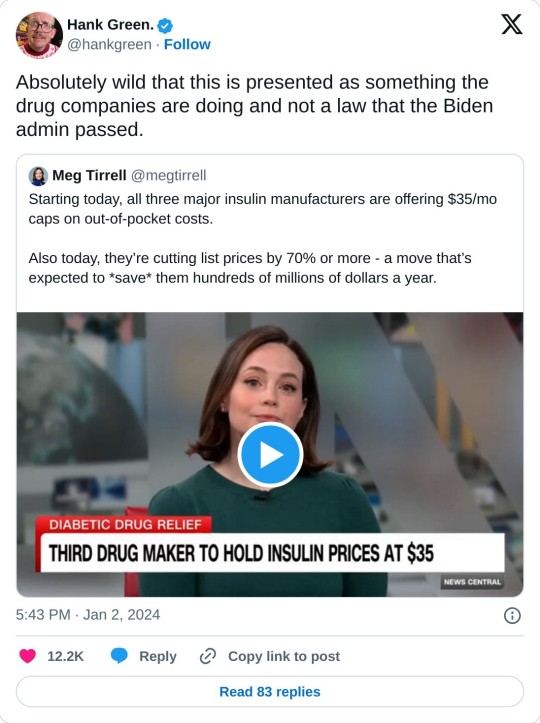
#per the inflation reduction act of 2022 passed by congress and signed into law by joe biden#politics
28K notes
·
View notes
Text
Things Biden and the Democrats did, this week #26
July 5-12 2024
The IRS announced it had managed to collect $1 billion in back taxes from high-wealth tax cheats. The program focused on persons with more than $1 million in yearly income who owned more than $250,000 in unpaid taxes. Thanks to money in Biden's 2022 Inflation Reduction Act the IRS is able to undertake more enforcement against rich tax cheats after years of Republicans cutting the agency's budget, which they hope to do again if they win power again.
The Biden administration announced a $244 million dollar investment in the federal government’s registered apprenticeship program. This marks the largest investment in the program's history with grants going out to 52 programs in 32 states. The President is focused on getting well paying blue collar opportunities to people and more people are taking part in the apprenticeship program than ever before. Republican pledge to cut it, even as employers struggle to find qualified workers.
The Department of Transportation announced the largest single project in the department's history, $11 billion dollars in grants for the The Hudson River Tunnel. Part of the $66 billion the Biden Administration has invested in our rail system the tunnel, the most complex Infrastructure project in the nation would link New York and New Jersey by rail under the Hudson. Once finished it's believed it'll impact 20% of the American economy by improving and speeding connection throughout the Northeast.
The Department of Energy announced $1.7 billion to save auto worker's jobs and convert factories to electronic vehicles. The Biden administration will used the money to save or reopen factories in Michigan, Ohio, Pennsylvania, Georgia, Illinois, Indiana, Maryland, and Virginia and retool them to make electric cars. The project will save 15,000 skilled union worker jobs, and created 2,900 new high-quality jobs.
The Department of Housing and Urban Development reached a settlement with The Appraisal Foundation over racial discrimination. TAF is the organization responsible for setting standards and qualifications for real estate appraisers. The Bureau of Labor Statistics last year found that TAF was 94.7% White and 0.6% Black, making it the least racially diverse of the 800 occupations surveyed. Black and Latino home owners are far more likely to have their houses under valued than whites. Under the settlement with HUD TAF will have to take serious steps to increase diversity and remove structural barriers to diversity.
The Department of Justice disrupted an effort by the Russian government to influence public opinion through AI bots. The DoJ shut down nearly 1,000 twitter accounts that were linked to a Russian Bot farm. The bots used AI technology to not only generate tweets but also AI image faces for profile pictures. The effort seemed focused on boosting support for Russia's war against Ukraine and spread negative stories/impressions about Ukraine.
The Department of Transportation announces $1.5 billion to help local authorities buy made in America buses. 80% of the funding will go toward zero or low-emission technology, a part of the President's goal of reaching zero emissions by 2050. This is part of the $5 billion the DOT has spent over the last 3 years replacing aging buses with new cleaner technology.
President Biden with Canadian Prime Minster Justin Trudeau and Finnish President Alexander Stubb signed a new agreement on the arctic. The new trilateral agreement between the 3 NATO partners, known as the ICE Pact, will boost production of ice breaking ships, the 3 plan to build as many as 90 between them in the coming years. The alliance hopes to be a counter weight to China's current dominance in the ice breaker market and help western allies respond to Russia's aggressive push into the arctic waters.
The Department of Transportation announced $1.1 billion for greater rail safety. The program seeks to, where ever possible, eliminate rail crossings, thus removing the dangers and inconvenience to communities divided by rail lines. It will also help update and improve safety measures at rail crossings.
The Department of the Interior announced $120 million to help tribal communities prepare for climate disasters. This funding is part of half a billion dollars the Biden administration has spent to help tribes build climate resilience, which itself is part of a $50 billion dollar effort to build climate resilience across the nation. This funding will help support drought measures, wildland fire mitigation, community-driven relocation, managed retreat, protect-in-place efforts, and ocean and coastal management.
The USDA announced $100 million in additional funds to help feed low income kids over the summer. Known as "SUN Bucks" or "Summer EBT" the new Biden program grants the families of kids who qualify for free meals at school $120 dollars pre-child for groceries. This comes on top of the traditional SUN Meals program which offers school meals to qualifying children over the summer, as well as the new under President Biden SUN Meals To-Go program which is now offering delivery of meals to low-income children in rural areas. This grant is meant to help local governments build up the Infrastructure to support and distribute SUN Bucks. If fully implemented SUN Bucks could help 30 million kids, but many Republican governors have refused the funding.
USAID announced its giving $100 million to the UN World Food Program to deliver urgently needed food assistance in Gaza. This will bring the total humanitarian aid given by the US to the Palestinian people since the war started in October 2023 to $774 million, the single largest donor nation. President Biden at his press conference last night said that Israel and Hamas have agreed in principle to a ceasefire deal that will end the war and release the hostages. US negotiators are working to close the final gaps between the two sides and end the war.
The Senate confirmed Nancy Maldonado to serve as a Judge on the Seventh Circuit Court of Appeals. Judge Maldonado is the 202nd federal Judge appointed by President Biden to be confirmed. She will the first Latino judge to ever serve on the 7th Circuit which covers Illinois, Indiana, and Wisconsin.
Bonus: At the NATO summit in Washington DC President Biden joined 32 allies in the Ukraine compact. Allies from Japan to Iceland confirmed their support for Ukraine and deepening their commitments to building Ukraine's forces and keeping a free and Democratic Ukraine in the face of Russian aggression. World leaders such as British Prime Minster Keir Starmer, German Chancellor Olaf Scholz, French President Emmanuel Macron, and Ukrainian President Volodymyr Zelenskyy, praised President Biden's experience and leadership during the NATO summit
#Joe Biden#Thanks Biden#politics#us politics#american politics#election 2024#tax the rich#climate change#climate action#food insecurity#poverty#NATO#Ukraine#Gaza#Russia#Russian interference
3K notes
·
View notes
Note
i love your fourth of july comics every year but this years feels extremely optimistic about biden’s abilities in the face of him letting roe get overturned and funding a gen*cide at worst or letting it happen at best by taking the bare minimum of regulatory action… i mean can he really be trusted at all anymore to do the right thing or act in line with the people’s demands? and how do we know the people behind project 2025 won’t just rig the election again to get in under false pretenses?
Hihi! Thank you for reading and enjoying my July 4th comics every year! I am in a non-US airport en route to a month-long trip in a place with sketchy internet, so sorry in advance for sloppiness in my response (and potentially going radio silent).
But:
I don't think he "let" Roe get overturned, since that was the Supreme Court's overwhelming conservative majority, which really started with Mitch McConnell refusing to approve Obama's appointee and forcing it into a 2016 election issue. The fact that Trump got to appoint 3 Supreme Court Justices is what got us here.
Re: Biden and the Israel/Hamas war ... on the one hand, there's definitely more that he could have done, but on the other hand, they are a whole other country over there. It's Hamas that initiated the Oct 7 attacks and took the hostages. It's Netanyahu and his right-wing government who decided to retaliate to such extreme extent. Biden can talk about how he would really like Netanyahu to stop fighting and step down, but at the end of the day that's not his call, any more than he can stop the Sudan fighting that is near-genocidal either.
So, to come to your question #1: "Can he really be trusted at all anymore to do the right thing or act in line with the people’s demands"?
For me, it's a resounding YES. Guyz, he has passed so much good domestic policies. My spouse works in green energy and the passing of the Inflation Reduction Act halved his anxiety and gave him legitimate hope. The tumblr post I linked to in my comic has links to many of the other great things that Biden has done. Tbh I voted for him in 2020 because "a moldy onion is still better than Trump", and I've been pleasantly surprised. Like how he tried to cancel student loans, the Supreme Court overturned it, and then he came back 6 months later with a different way to do it that didn't lead to a court challenge.
Is he perfect? Hell no. There's tons of stuff that I wish he did more about, or he went further on, but also he's just one guy heading one branch of government who is heading into an election year. (Just like FDR promising not joining WWII, while behind the scenes doing all the Lend-Lease Act stuff). And "the people" have lots of demands, many of them conflicting.
I'd also like to push at the unspoken part of your question... "Can he really be trusted to do the right thing..." compared to whom? Because right now the answer is "compared to Trump." And compared to Trump... I don't even trust Trump to respect the results of a legitimate election. Heck, he might just take his favorite state secrets, sell them to the highest bidder (or just show them off to someone for funzies), and then claim Presidential immunity. A decent Democrat who got stuff done vs someone who probably wants to pardon himself and all his friends and do Project 2025 stuff is not even on the same level. (Do I wish that there was a viable Democratic alternative to Biden? Sure! But who?) Heck, at this point -- imagine if it's Kamala Harris vs. Trump. Who would you vote for?
As for your question #2: "How do we know the people behind project 2025 won’t just rig the election again to get in under false pretenses?"
We don't. But also what can we do besides showing up to vote?
Actually, I need bullet points for this:
The 2022 midterm elections brought in fewer-than-expected election-deniers into crucial electoral offices at the state level, which means that hopefully most state electoral boards will continue to have integrity
Yes, voting is harder but at least we can still vote. So it's about getting out there and getting your vote counted. For some states, it involves waiting in 8 hour lines. For some states, it involves bringing 2 forms of ID. Document. Track. Make sure it's dropped off in a real ballot box and not a fake one. Don't believe messaging that the voting is happening on a different day or location, etc.
A 50.1% majority is easily challenged. A 55% majority, less so. Which means getting people out to vote.
The more people know about and think about the reality of a second Trump term (versus being disappointed by a Biden term), the more they will be motivated to vote against Trump.
Finally, let's be real here: I'm braced for a 2nd Trump term. That said:
I'm still going to go and vote for Biden, because the only way to prevent a 2nd Trump term is to vote.
A Trump term where either the House or Senate is controlled by the Democrats will be *very* different from a clean Republican sweep.
Even with a clean Republican sweep on the federal level, States have so much more power now, and voting the state level stuff will help shore up Democratic goals for the future. States get to draw voting districts however they want. States get to decide on abortion policies. If you live in a deep Red state, there still might be things to vote for that make it easier to live in now, and turn it purple a few elections down the line.
So at the end of the day, it's "Vote AND". Vote and keep living your best life. Vote and tell others about Project 2025. Vote and have hope. Even if Trump wins, at least you'll have voted against him. Vote and stay to build up a progressive wave for the next election.
#long ranty reply oops#fun fact: my congressional district had a tied vote during the primaries... so literally every vote counted#and then was recounted and one person pulled ahead by <25 votes i think
897 notes
·
View notes
Text
From the article:
The [green hydrogen] facility has become an example of how oil-rich states like Texas — which leads the nation in annual wind power production and is behind only California in annual solar power production — are buying into the renewable energy boom. Much of this investment was spurred by former President Joe Biden’s administration and his legislative goals, such as the roughly $500 billion that Congress set aside through its approval of the bipartisan Inflation Reduction Act in 2022. This eagerness to invest in renewable energy has come at a time when climate change has driven average global temperatures to roughly 1.1 degrees Celsius (and steadily climbing) above pre-industrial levels. To stave off the worst of the ongoing climate crisis’s effects, domestically and abroad, renewable sources like green hydrogen bear promise, scientists say. And that promise is already being fulfilled in nations like China, Saudi Arabia, and Sweden, all of whom are global leaders in green hydrogen production facilities that are in final planning or financing phases, according to a hydrogen projects data tracker published by the International Energy Agency last year. Meanwhile, in the U.S., some 67 green hydrogen projects are planned through at least 2029, according to an energy transition paper published by the workforce solutions company Airswift. The alternative fuel has always had promise, says Dr. Alan Lloyd, a renewable energy researcher at the University of Texas. It’s not a future pipe dream, he adds. But rather, now, “it’s happening.”
#green hydrogen#clean energy#clean fuel#climate change#global warming#hope#good news#climate resilience#renewable energy#green energy#environment#alternative fuel
224 notes
·
View notes
Text
From a country where voting is not a choice, but a duty, it's interesting seeing American discourse every four years on whether or not voting matters. This year there's an added layer, because Joe Biden has been supporting Israel's genocide against Palestine. Now there's a pervading sentiment - both in and out of the US - that voting for Joe Biden supports Palestinian genocide, and it's an American's moral duty to withhold their vote in support of Palestine.
I guess the question I ask is: how is withholding your vote effective activism?
If you don't vote, and Trump wins, he says he will deport pro-Palestine demonstrators. He says he supports Israel's right to defend itself. If you vote independent, and Trump wins the same thing happens.
If Biden wins, he will continue his support of Israel.
So: Is voting really the battleground for the Palestinian genocide, when either outcome leads down the same road?
And what other battles are being fought in this presidential race?
Gun laws - Biden passed "the most significant gun safety legislation in more than two decades", the Bipartisan Safer Communities Act. It includes enhanced background checks for gun purchasers, and prohibits individuals convicted of domestic violence towards a romantic partner from purchasing a gun (wherein the past a 'boyfriend loophole' had existed, wherein the law only applied if an individual was convicted of domestic violence against a spouse or cohabitant). Trump has promised to overturn Biden's new laws.
Healthcare - Uninsured Americans are at an all-time low under Biden's administration, with only 7.6% of Americans being uninsured in the second quarter of 2023. The number of people who signed up to Obamacare in 2024 is at 21.3 million - and Trump plans to repeal it.
Climate change - Biden's Inflation Reduction Act invests 300 billion dollars towards clean energy. Electricity generation from renewable energy sources — including wind, solar and hydropower — surpassed coal-fired generation in the electric power sector for the first time in 2022, making it the second-biggest source behind natural gas generation. At a recent dinner with oil executives and lobbyists, the Republican promised to eliminate Mr Biden's new climate rules and environmental regulations if they donated $1bn to his campaign.
Much has been said about Trump's second term beyond the above three points. @batboyblog posted a very clear and concise graphic on Trump's plans for his second term.
The BBC has also posted about Trump's plans for his second term, which I'll screenshot:
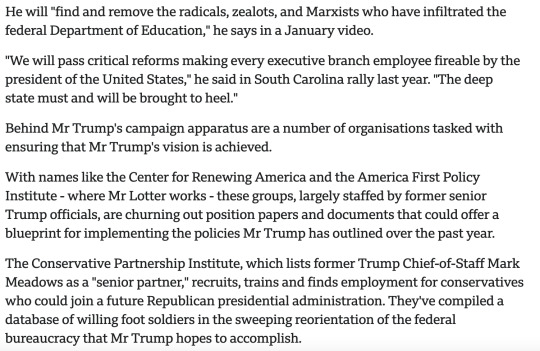
Trump is now a felon, but I was really shocked to learn about how little impact this has on his ability to run as president. His supporters are likely to stay by his side, because they believe in these policies.
Biden does not have the same luxury. I don't think he should have the same luxury. Still, I feel like it's important to point out that Trump and Biden's opinions on Israel and Palestine align, but there are a plethora of other issues they do not align on. As a voter, as an activist, when given two political parties, why would you choose based on the similarities as opposed to the differences?
Ways to help Gaza.
Vetted gofundmes.
Other links to help Palestine.
#uspol#politics#donald trump#joe biden#i wish americans had a preferential system#that meant an independent vote isnt the equivalent of throwing your hands in the air and giving up
439 notes
·
View notes
Text
The IRS plans to end a major tax loophole for wealthy taxpayers that could raise more than $50 billion in revenue over the next decade, the U.S. Treasury Department says. The proposed rule and guidance announced Monday includes plans to essentially stop “partnership basis shifting” — a process by which a business or person can move assets among a series of related parties to avoid paying taxes. Biden administration officials said after evaluating the practice that there are no economic grounds for these transactions, with Deputy Treasury Secretary Wally Adeyemo calling it “really just a shell game.” The officials said the additional IRS funding provided through the 2022 Inflation Reduction Act had enabled increased oversight and greater awareness of the practice. “These tax shelters allow wealthy taxpayers to avoid paying what they owe,” IRS commissioner Danny Werfel said. Due to previous years of underfunding, the IRS had cut back on the auditing of wealthy individuals and the shifting of assets among partnerships and companies became common. The IRS says filings for large pass-through businesses used for the type of tax avoidance in the guidance increased 70% from 174,100 in 2010 to 297,400 in 2019. However, audit rates for these businesses fell from 3.8% to 0.1% in the same time frame. Treasury said in a statement announcing the new guidance that there is an estimated $160 billion gap between what the top 1% of earners likely owe in taxes and what they pay.
301 notes
·
View notes
Text
The Best News of Last Week - August 21, 2023
🌊 - Discover the Ocean's Hidden Gem Deep down in the Pacific
1. Massachusetts passed a millionaire's tax. Now, the revenue is paying for free public school lunches.

Every kid in Massachusetts will get a free lunch, paid for by proceeds from a new state tax on millionaires.
A new 4% tax on the state's wealthiest residents will account for $1 billion of the state's $56 billion fiscal budget for 2024, according to state documents. A portion of those funds will be used to provide all public-school students with free weekday meals, according to State House News Service.
2. Plant-based filter removes up to 99.9% of microplastics from water

Researchers may have found an effective, green way to remove microplastics from our water using readily available plant materials. Their device was found to capture up to 99.9% of a wide variety of microplastics known to pose a health risk to humans.
3. Scientists Find A Whole New Ecosystem Hiding Beneath Earth's Seafloor
youtube
Most recently, aquanauts on board a vessel from the Schmidt Ocean Institute used an underwater robot to turn over slabs of volcanic crust in the deep, dark Pacific. Underneath the seafloor of this well-studied site, the international team of researchers found veins of subsurface fluids swimming with life that has never been seen before.
It's a whole new world we didn't know existed.
4. How solar has exploded in the US in just a year
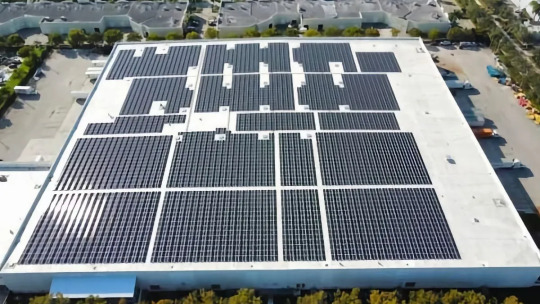
Solar and storage companies have announced over $100 billion in private sector investments in the US since the passage of the Inflation Reduction Act (IRA) a year ago, according to a new analysis released today by the Solar Energy Industries Association (SEIA).
Since President Joe Biden signed the IRA in August 2022, 51 solar factories have been announced or expanded in the US.
5. Researchers have identified a new pack of endangered gray wolves in California

A new pack of gray wolves has shown up in California’s Sierra Nevada, several hundred miles away from any other known population of the endangered species, wildlife officials announced Friday.
It’s a discovery to make researchers howl with delight, given that the native species was hunted to extinction in California in the 1920s. Only in the past decade or so have a few gray wolves wandered back into the state from out-of-state packs.
6. Record-Breaking Cleanup: 25,000 Pounds of Trash Removed from Pacific Garbage Patch

Ocean cleanup crews have fished out the most trash ever taken from one of the largest garbage patches in the world.
The Ocean Cleanup, a nonprofit environmental engineering organization, saw its largest extraction earlier this month by removing about 25,000 pounds of trash from the Great Pacific Garbage Patch, Alex Tobin, head of public relations and media for the organization
7. The Inflation Reduction Act Took U.S. Climate Action Global
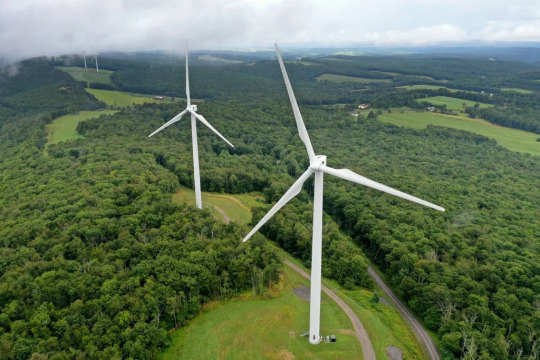
The U.S. Inflation Reduction Act (IRA) aimed to promote clean energy investments in the U.S. and globally. In its first year, the IRA successfully spurred other nations to develop competitive climate plans.
Clean energy projects in 44 U.S. states driven by the IRA have generated over 170,600 jobs and $278 billion in investments, aligning with Paris Agreement goals.
---
That's it for this week :)
This newsletter will always be free. If you liked this post you can support me with a small kofi donation here:
Buy me a coffee ❤️
Also don’t forget to reblog this post with your friends.
1K notes
·
View notes
Text
Excerpt from this story from Politico:
A federal judge ruled Tuesday that EPA, the Interior and Energy Departments and other agencies unlawfully froze funds under Democrats’ climate and infrastructure spending laws, ordering the agencies to immediately resume disbursing the money.
The ruling from Judge Mary McElroy of the U.S. District Court for the District of Rhode Island, who was named to the bench by President Donald Trump in 2019, comes on the eve of an expected decision from another judge in Washington on whether EPA lawfully terminated $20 billion in climate grants. That case and other litigation are part of a complex web of lawsuits over frozen funds and terminated grants playing out in multiple courts.
McElroy said she wanted to be “crystal clear” that the president is entitled to enact his agenda. However, “agencies do not have unlimited authority to further a President’s agenda, nor do they have unfettered power to hamstring in perpetuity two statutes passed by Congress during the previous administration.”
The lawsuit was brought by six conservation and community groups that received grants under the Inflation Reduction Act that was enacted in 2022 and the bipartisan infrastructure law enacted in 2021.
The grant recipients demonstrated that the indefinite freeze of their funds was “neither reasonable nor reasonably explained,” McElroy wrote, adding that the agencies did not show “that they considered the consequences of their broad, indefinite freezes: projects halted, staff laid off, goodwill tarnished.”
And McElroy rejected the administration’s claim of “broad powers” to pause spending. Agencies have “narrower powers” to pause or terminate individual grants but not “cases of vast economic and political significance—like this one,” she wrote, citing the Supreme Court’s major questions doctrine, which looks skeptically at broad claims of executive power.
70 notes
·
View notes
Text
"The Biden administration on Thursday [August 15, 2024] released prices for the first 10 prescription drugs that were subject to landmark negotiations between drugmakers and Medicare, a milestone in a controversial process that aims to make costly medications more affordable for older Americans.
The government estimates that the new negotiated prices for the medications will lead to around $6 billion in net savings for the Medicare program in 2026 alone when they officially go into effect, or 22% net savings overall. That is based on the estimated savings the prices would have produced if they were in effect in 2023, senior administration officials told reporters Wednesday.
The Biden administration also expects the new prices to save Medicare enrollees $1.5 billion in out-of-pocket costs in 2026 alone.
“For so many people, being able to afford these drugs will mean the difference between debilitating illness and living full lives,” Chiquita Brooks-LaSure, administrator for the Centers for Medicare & Medicaid Services, told reporters. “These negotiated prices. They’re not just about costs. They are about helping to make sure that your father, your grandfather or you can live longer, healthier.”
It comes one day before the second anniversary of President Joe Biden’s signature Inflation Reduction Act, which gave Medicare the power to directly hash out drug prices with manufacturers for the first time in the federal program’s nearly 60-year history.
Here are the negotiated prices for a 30-day supply of the 10 drugs, along with their list prices based on 2023 prescription fills, according to a Biden administration fact sheet Thursday.
What Medicare and beneficiaries pay for a drug is often much less than the list price, which is what a wholesaler, distributor or other direct purchaser paid a manufacturer for a medication before any discounts...

The administration unveiled the first set of medications selected for the price talks in August 2023, kicking off a nearly yearlong negotiation period that ended at the beginning of the month.
The final prices give drugmakers, which fiercely oppose the policy, a glimpse of how much revenue they could expect to lose over the next few years. It also sets a precedent for the additional rounds of Medicare drug price negotiations, which will kick off in 2025 and beyond.
First 10 drugs subject to Medicare price negotiations
Eliquis, made by Bristol Myers Squibb, is used to prevent blood clotting to reduce the risk of stroke.
Jardiance, made by Boehringer Ingelheim and Eli Lilly, is used to lower blood sugar for people with Type 2 diabetes.
Xarelto, made by Johnson & Johnson, is used to prevent blood clotting, to reduce the risk of stroke.
Januvia, made by Merck, is used to lower blood sugar for people with Type 2 diabetes.
Farxiga, made by AstraZeneca, is used to treat Type 2 diabetes, heart failure and chronic kidney disease.
Entresto, made by Novartis, is used to treat certain types of heart failure.
Enbrel, made by Amgen, is used to treat autoimmune diseases such as rheumatoid arthritis.
Imbruvica, made by AbbVie and J&J, is used to treat different types of blood cancers.
Stelara, made by Janssen, is used to treat autoimmune diseases such as Crohn’s disease.
Fiasp and NovoLog, insulins made by Novo Nordisk.
In a statement Thursday, Biden called the new negotiated prices a “historic milestone” made possible because of the Inflation Reduction Act. He specifically touted Vice President Kamala Harris’ tiebreaking vote for the law in the Senate in 2022.
Harris, the Democratic presidential nominee, said in a statement that she was proud to cast that deciding vote, adding there is more work to be done to lower health-care costs for Americans.
“Today’s announcement will be lifechanging for so many of our loved ones across the nation, and we are not stopping here,” Harris said in a statement Thursday, noting that additional prescription drugs will be selected for future rounds of negotiations."
-via CNBC, August 15, 2024
#public health#healthcare#united states#us politics#biden#harris#kamala harris#medicare#medicaid#healthcare accessibility#prescription drugs#big pharma#insulin#good news#hope
3K notes
·
View notes
Text
During a Tuesday appearance in New York City, Ford CEO Jim Farley focused on two big threats to U.S. auto manufacturers and their suppliers: Trump’s vow to withdraw support for electric vehicles and his enthusiasm for big, broad tariffs, especially against Canada and Mexico.
“Jobs will be at risk” if Trump ends the EV support, Farley said, according to an account in the Detroit News.
As for those tariffs, Farley said, they could “blow a hole in the U.S. industry that we’ve never seen.”
CEOs aren’t always correct, and they’re certainly not always looking out for the best interests of their workers. But the admonition from Farley, who was speaking at the Wolfe Research Auto, Auto Tech and Semiconductor Conference, echoes what labor unions and many analysts have been saying about the industry and how it will fare if Trump makes the changes he has promised.
Recent federal support for EVs has helped spark an explosion in factory construction for the vehicles and their component parts, in a region stretching from the upper Midwest to a new “battery belt” in the South. It also has fueled rising EV sales, allowing the “legacy” U.S. automakers like Ford and General Motors to make up some of the ground they’ve lost to competitors in China, where the government has spent more than two decades nurturing its own EV industry.
But government subsidies in the U.S. have largely come through the Inflation Reduction Act, the sweeping 2022 Democratic climate legislation President Joe Biden signed into law. And Trump is not a fan — of clean energy policies generally (he has famously called climate change a “hoax”) or of federal EV policies (which he says are forcing the industry to make unappealing, unprofitable cars).
54 notes
·
View notes
Text
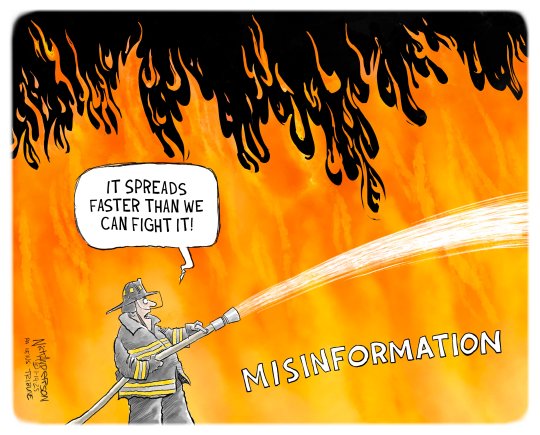
Nick Anderson/Political Cartoonist :: @Nick_Anderson_
Spreading like...
* * * *
LETTERS FROM AN AMERICAN
January 13, 2025
Heather Cox Richardson
Jan 14, 2025
The incoming Trump administration is working to put its agenda into place.
Although experts on the National Security Council usually carry over from one administration to the next, Aamer Madhani and Zeke Miller of the Associated Press today reported that incoming officials for the Trump administration are interviewing career senior officials on the National Security Council about their political contributions, how they voted in 2024, and whether they are loyal to Trump. Most of them are on loan from the State Department, the Federal Bureau of Investigation, and the Central Intelligence Agency and, understanding that they are about to be fired, have packed up their desks to head back to their home agencies.
The National Security Council is the main forum for the president to hash out decisions in national security and foreign policy, and the people on it are picked for their expertise. But Trump’s expected pick to become his national security advisor—his primary advisor on all national security issues—Representative Mike Waltz (R-FL) told right-wing Breitbart News that he wants to staff the NSC with people who are “100 percent aligned with the president’s agenda.”
Ranking member of the House Oversight and Government Reform Committee Representative Gerry Connolly (D-VA) warned that the loyalty purge “threatens our national security and our ability to respond quickly and effectively to the ongoing and very real global threats in a dangerous world.”
But during Trump’s first term, it was Alexander Vindman, who was detailed to the NSC, and his twin Eugene Vindman, who was serving the NSC as an ethics lawyer, who reported concerns about Trump’s July 2019 call to Ukraine president Volodymyr Zelensky to their superiors. This launched the investigation that became Trump’s first impeachment, and Trump appears anxious to make sure future NSC members will be fiercely loyal to him.
With extraordinarily slim majorities in the House and Senate, Republicans are talking about pushing through their entire agenda through Congress as a single bill in the process known as budget reconciliation. Budget reconciliation, which deals with matters related to spending, revenue, and the debt limit, is one of the few things that cannot be filibustered, meaning that Republicans could get a reconciliation bill through the Senate with just 50 votes. If they can hold their conference together, they could get the package through despite Democratic opposition.
House speaker Mike Johnson and Republican leaders have said that the House intends to pass a reconciliation bill that covers border security, defense spending, the extension of Trump’s 2017 tax cuts, spending cuts to social welfare programs, energy deregulation, and an increase in the national debt limit.
But Li Zhou of Vox points out that it’s not quite as simple as it sounds to get everything at once, because budget reconciliation measures are not supposed to include anything that doesn’t relate to the budget, and the Senate parliamentarian will advise stripping those things out. In addition, the budget cuts Republicans are circulating include cuts to popular programs like Medicaid, the Affordable Care Act (more commonly known as Obamacare), the Inflation Reduction Act’s investment in combating climate change, and the supplemental nutrition programs formerly known as food stamps.
Still, a lot can be done under budget reconciliation. Democrats under Biden passed the 2021 American Rescue Plan and the 2022 Inflation Reduction Act under reconciliation, and Republicans under Trump passed the 2017 Trump tax cuts the same way.
A wrinkle in those plans is the Republicans’ hope to raise the national debt limit. As soon as they take control of Congress and the White House, Republicans will have to deal immediately with the treasury running up against the debt limit, a holdover from World War I that sets a limit on how much the country can borrow. Although he has complained bitterly about spending under Biden, Trump has demanded that Congress either raise or abandon the debt ceiling because the nonpartisan Congressional Budget Office estimates that the tax cuts he wants to extend will add $4.6 trillion to the deficit over the next ten years, and cost estimates for his deportation plans range from $88 billion to $315 billion a year.
Republicans are backing away from adding a debt increase to the budget reconciliation package out of concern that members of the far-right Freedom Caucus will kill the entire bill if they do. Those members want no part of raising the national debt and have demanded $2 trillion in budget cuts before they will consider it. Tonight, Senate majority leader John Thune (R-SD) told Jordain Carney of Politico that Senate Republicans expect the debt limit to be stripped out of the budget reconciliation measure.
So Republicans are currently exploring the idea of leveraging aid to California for the deadly fires in order to get Democrats to sign on to raising the debt ceiling. Meredith Lee Hill of Politico reported that Trump met with a group of influential House Republicans over dinner Sunday night at Mar-a-Lago to discuss tying aid for the wildfires to raising the debt ceiling. Today, House speaker Mike Johnson (R-LA) confirmed to reporter Hill that this plan is under discussion.
Indeed, Republicans have been in the media suggesting that disaster aid to Democratic states should be tied to their adopting Republican policies. The Los Angeles fires have now claimed at least 24 lives. More than 15,000 firefighters are working to extinguish the wildfires, which have been driven by Santa Ana winds of up to 98 miles (158 km) an hour over ground scorched by high temperatures and low rainfall since last May, conditions caused by climate change.
On the Fox News Channel today, Representative Zach Nunn (R-IA) said: "We will certainly help those thousands of homes and families who have been devastated, but we also expect you to change bad behavior. We should look at the same for these blue states who have run away with a broken tax policy.... Those governors need to change their tune now.” Senator Ron Johnson (R-WI) blamed Democrats for the fires and said of federal disaster relief: “I certainly wouldn't vote for anything unless we see a dramatic change in how they're gonna be handling these things in the future.”
Aside from the morality of demanding concessions for disaster aid after President Joe Biden responded with full and unconditional support for regions hit by Hurricane Helene (although Tennessee governor Bill Lee is still lying that Biden delayed aid to his state, when in fact he delayed in asking for it, as required by law), there is a financial problem with this argument. As economist Paul Krugman noted today in his Krugman Wonks Out, California “is literally subsidizing the rest of the United States, red states in particular, through the federal budget.”
In 2022, the most recent year for which information is available, California paid $83 billion more to the federal government than it got back. Washington state also subsidized the rest of the country, as did most of the Northeast. That money flowed to Republican-dominated states, which contributed far less to the federal government than they received in return.
Krugman noted that “if West Virginia were a country, it would in effect be receiving foreign aid equal to more than 20 percent of its G[ross] D[omestic] P[roduct].” Krugman refers to the federal government as “an insurance company with an army,” and he notes that there is “nothing either the city or the state could have done to prevent” the wildfires. “If the United States of America doesn’t take care of its own citizens, wherever they live and whatever their politics, we should drop “United” from our name,” he writes. “As it happens, however, California—a major driver of U.S. prosperity and power—definitely has earned the right to receive help during a crisis.”
Today, Biden announced student loan forgiveness for another 150,000 borrowers, bringing the total number of people relieved of student debt to more than 5 million borrowers, who have received $183.6 billion in relief. This has been achieved through making sure existing debt relief programs were followed, as they had not been in the past.
Establishment Republicans continue to fight MAGA Republicans, and MAGA fights among itself: former Trump ally Steve Bannon yesterday called Trump’s sidekick Elon Musk “truly evil” and vowed to “take this guy down.” But even as their enablers in the legacy media are normalizing Republican behavior, a reality-based media is stepping up to counter the disinformation.
Aside from the many independent outlets that have held MAGA Republicans to account, MSNBC today announced that progressive journalist Rachel Maddow will return to hosting a nightly one-hour show for the first 100 days of the Trump presidency.
And today journalist Jennifer Rubin joined her colleagues who have abandoned the Washington Post as it swung toward Trump. She resigned from the Washington Post with the announcement that she and former White House ethics lawyer Norm Eisen have started a new media outlet called The Contrarian. Joining them is a gold-star list of journalists and commentators who have stood against the rise of Trump and the MAGA Republicans, many of whom have left publications as those outlets moved rightward.
“Corporate and billionaire owners of major media outlets have betrayed their audiences’ loyalty and sabotaged journalism’s sacred mission—defending, protecting and advancing democracy,” Rubin wrote in her resignation announcement. In contrast, the new publication “will be a central hub for unvarnished, unbowed, and uncompromising reported opinion and analysis that exists in opposition to the authoritarian threat.”
“The urgency of the task before us cannot be overstated,” The Contrarian’s mission statement read. “We have already entered the era of oligarchy—rule by a narrow clique of powerful men (almost exclusively men). We have little doubt that billionaires will dominate the Trump regime, shape policy, engage in massive self-dealing, and seek to quash dissent and competition in government and the private sector. As believers in free markets subject to reasonable regulation and economic opportunity for all, we recognize this is a threat not only to our democracy but to our dynamic, vibrant economy that remains the envy of the world.”
In what appears to be a rebuke to media outlets that are cozying up to Trump, The Contrarian’s credo is “Not Owned by Anybody.”
LETTERS FROM AN AMERICAN
HEATHER COX RICHARDSON
#wildfires#nick anderson#political cartoon#Letters From An American#Heather Cox Richardson#incoming#TFG#corporate and billionaire owners#The Contrarian#corruption#disaster aid#house republicans#MAGA agenda
69 notes
·
View notes